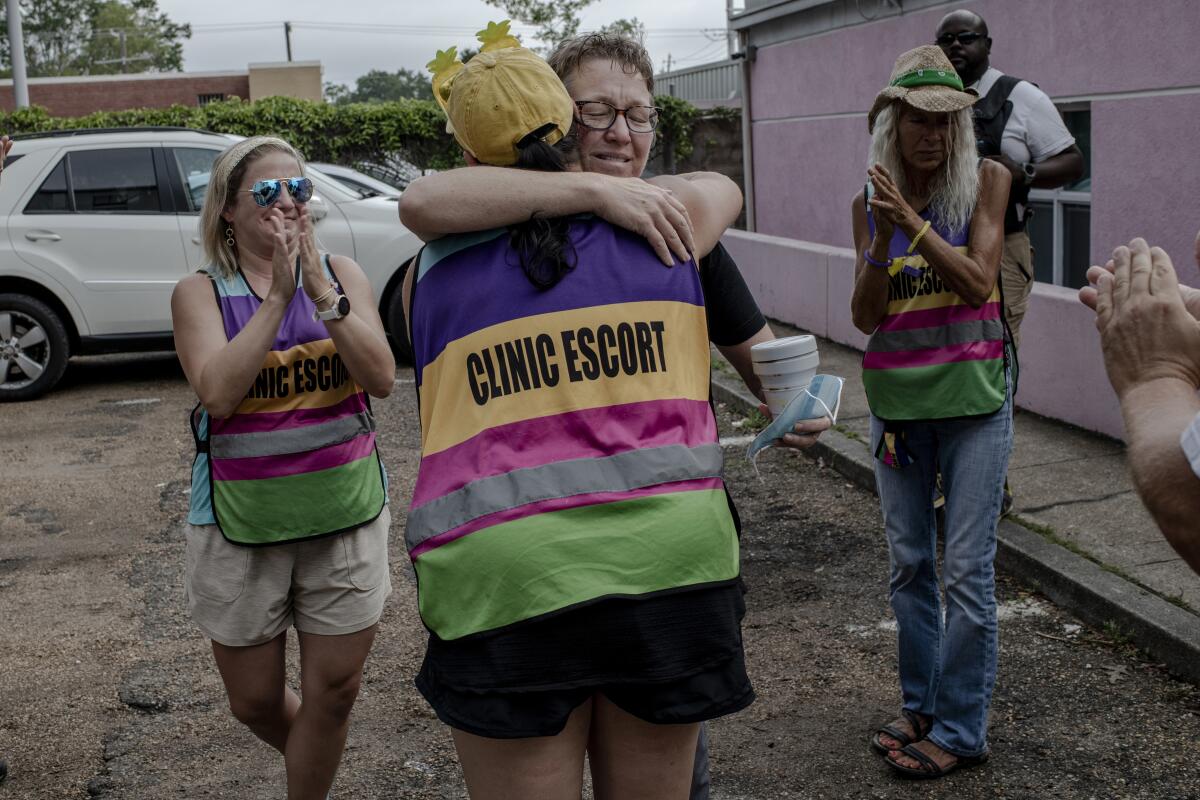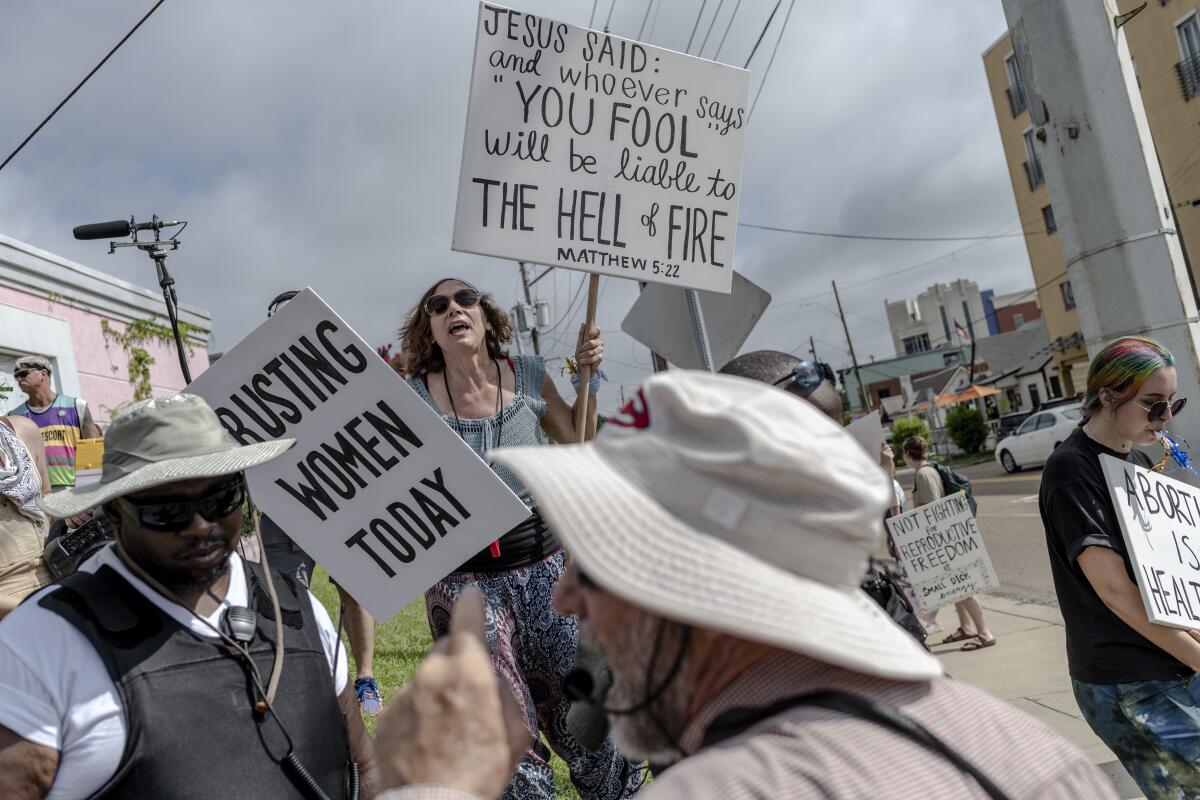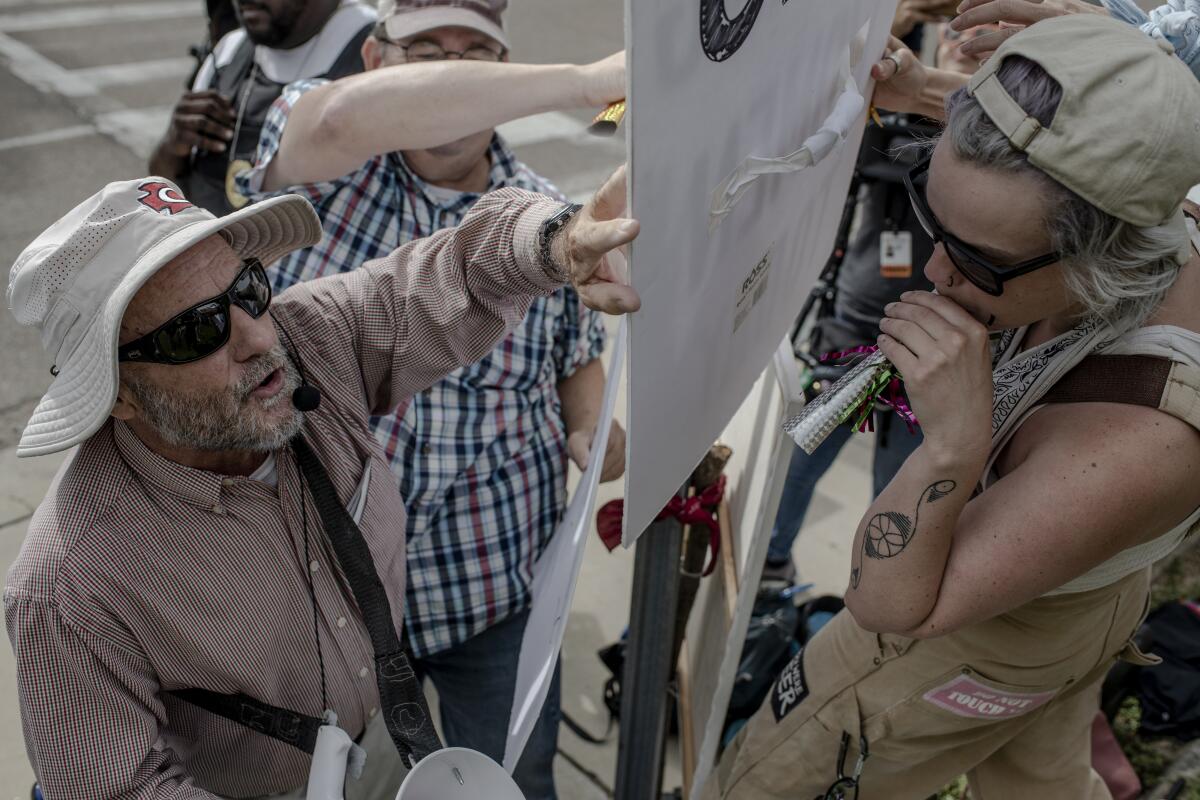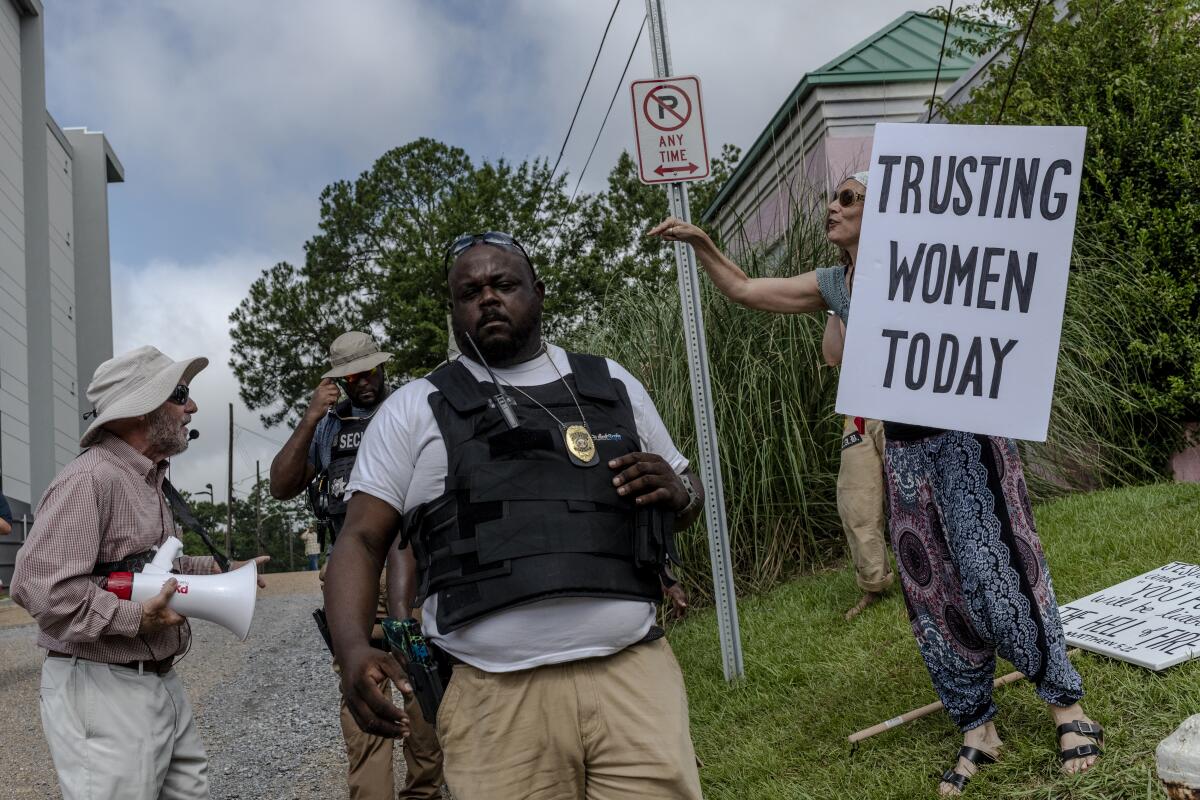The last abortion clinic in Mississippi closes its doors

JACKSON, Miss. — Just before dawn Wednesday outside the Jackson Women’s Health Organization, Derenda Hancock propped a hand-scrawled placard on a folding chair.
“We Won’t Back Down,” it said in bold red letters.
Then she put up another sign — “Hell hath no fury like a woman scorned” — and plopped down on the sidewalk.
“This is the hardest day,” said the 63-year-old volunteer, lighting a cigarette as a boombox played Tom Petty’s “Free Fallin’.”
It was the last day of Mississippi’s last abortion clinic. The last day Hancock would wrap her skinny arm around a patient as she ushered her through the clinic’s glass door for an abortion. The last day staffers would answer the phone — “Jackson Women’s Health. May I help you?” — knowing they actually could help.
Dubbed “The Pink House” for its bubblegum-pink exterior walls, the clinic has long been the epicenter of the nation’s fight over abortion and the last bastion of reproductive rights in this staunchly conservative state.
Opening in 1995, an era when antiabortion activists mounted a fierce campaign of intimidation, the clinic steadfastly served women from across Mississippi and neighboring states. Since 2004, it has been the only abortion clinic in Mississippi.

Four years ago, it challenged a new Mississippi law that banned abortions after 15 weeks of pregnancy, arguing that the new restrictions violated Roe vs. Wade, the 1973 Supreme Court ruling that guaranteed the right to abortion. It was the main plaintiff in Dobbs v. Jackson Women’s Health Organization, the case that led the Supreme Court to overturn Roe on June 24.
Three days later, Mississippi’s attorney general certified a 2007 so-called trigger law that bans all abortions, except in cases of rape or when a pregnant woman’s life is in danger. The Pink House had 10 days to perform abortions before the law went into effect.
Hancock, who co-founded the Pink House Defenders nearly 10 years ago, steeled herself for the final showdown between antiabortion activists preaching on the sidewalk and the security guards and volunteers in rainbow-striped vests escorting patients inside.
“The war will always go on, but this particular battle is over,” she said as she adjusted her straw hat in the sweltering heat. “I can’t imagine being 25 or 30 years old in Mississippi today, waking up knowing I have no control over my body.”
Mississippi is surrounded by Alabama, Louisiana, Arkansas and Tennessee, red states that now ban abortion in all or most cases. The closest clinics for women in Mississippi are now in Georgia and Florida — both places that could see more restrictions. Then the nearest option would be Granite City, Ill., about 500 miles by car.
“Is it sad, yes,” Diane Derzis, the 68-year-old owner of the Jackson clinic, said Wednesday, noting that the phones were ringing nonstop with patients trying to make appointments. “Women in the South and in Mississippi will no longer have direct access to medical services — that is the saddest thing. But it’s also positive because we’re moving forward into a place where we can see other patients.”
Derzis, who has worked in abortion care for 46 years and has adopted the handle “Abortion Queen,” said she plans to open a new clinic, Pink House West, next week in New Mexico. It will be more than 1,000 miles away from Jackson.
Early Wednesday, about an hour after Hancock arrived at the clinic, antiabortion activists were setting up folding chairs outside and erecting signs that said: “WE ARE PRAYING FOR YOU.”
“I feel so sick I could throw up,” said Doug Lane, a 70-year-old pastor. “It’s terrible they’re going to kill babies in there today. These babies shouldn’t be dying. Roe vs. Wade is overturned.”

Lane was arrested for disturbing the peace outside the clinic the day it opened 27 years ago — and he said that the Lord had called him to be there since.
When the clinic’s executive director, Shannon Brewer, who has worked for the Pink House for more than 20 years, stepped out of a white SUV, the escorts gathered around her in the parking lot and clapped.
“Turn to Jesus, Shannon!” an antiabortion protester shouted. “Repent!”
The arrival of Dr. Cheryl Hamlin, who has traveled from Massachusetts for the last five years to perform abortions at the clinic, prompted more heckling.
“You are a wicked, wicked woman and you need to come to God today,” said Allan Siders, a 36-year-old landscaper, clutching a brown leather Holy Bible. “Repent for the kingdom of heaven is at hand. No murderers shall inherit the kingdom of God.”
An hour later, Hamlin emerged from inside the clinic.
“Repent! Repent!” Lane screamed through a bullhorn as he tried to approach her. But his words were drowned out by abortion rights activists who blocked him holding signs that said “TRUSTING WOMEN TODAY” and “KEEP YOUR THEOLOGY OFF MY BIOLOGY.”
Someone in the crowd switched on a device that wailed like a police siren.
An escort leaned over to Hamlin. “Don’t let them see you cry,” he said.
“I can’t wrap my head around what it’s going to be like to get on a plane to go home,” Hamlin said. “I’m overwhelmed. I’m angry that these people don’t care anything about the women who walk through this clinic.”
Hamlin said she worried about the women of Mississippi, the poorest state in the nation with the highest infant mortality rate. Many residents, particularly Black women in the impoverished rural Delta region, already struggled to get to the Jackson clinic. It seemed improbable that they would be able to travel hundreds of miles.
But she said this was not the end. Her goal — as unlikely as it sounds — was to make Mississippi a blue state.
“People say, ‘Oh, what am I supposed to do?’” Hamlin said. “And I’m like: ‘Vote.’”
For decades, the clinic staff and volunteers have struck a defiant tone. Derzis’ first clinic in Birmingham, Ala., was the target of a 1998 bombing that claimed the life of a security guard and critically injured a nurse. She knew what she was getting into when she took on a clinic in Mississippi.
In the early 1980s, Mississippi had 14 abortion providers. But their numbers began to dwindle as the U.S. Supreme Court’s 1992 Planned Parenthood vs. Casey decision allowed state legislators to introduce a barrage of abortion restrictions and antiabortion protesters upped their intimidation.
In 2013, as the clinic was threatened with closure after the state passed new regulations on abortion, Derzis painted the clinic a Pepto-Bismol pink. Over the years, the color faded, but the clinic persisted.
“This Clinic Stays Open,” a banner out front proclaimed throughout the years.
The mood of resistance did not change after Roe was struck down.
“Even though the Pink House Defenders will be more or less laying down our torches, it doesn’t mean we’ll be done,” Hancock said at a news conference that day. “Stay tuned for jezebel rebellion.”
On Tuesday, lawyers for the clinic went to court seeking to block the state’s so-called trigger law that bans abortions, citing a 1998 Supreme Court ruling that “abortion is protected” under the state Constitution. The judge refused the request.
As tension built outside the clinic on its last day, a police SUV stopped outside in the middle of the street. The escorts blasted Lady Gaga’s “Bad Romance,” trying to drown out the protesters’ bullhorns.
The din grew louder as a stream of women and girls began to pull in to the clinic in sedans and SUVs with license plates from Mississippi, Louisiana and Texas.
A woman clutching a blanket bowed her head as she was ushered past the bellowing street preachers toward the glass door.
“The Bible says thou shall not kill!” a protester hollered.

A clinic escort held up a placard: “GOD SEES YOU OUT HERE EVERY DAY HARASSING WOMEN AND SHE IS NOT HAPPY.”
On Thursday, clinic staff will offer follow-up appointments to women who have already had abortions. Soon the phones will be diverted and women will be referred to clinics in Columbus, Ga., and other states. About half of the Mississippi clinic’s staff will move to the new clinic in New Mexico.
Hancock said the Pink House Defenders did not have the resources to help women travel out of state.
“Today’s the end,” she said.
Before they left the clinic, she and the other volunteers snapped photos of one another and mounted a row of messages on the spikes of the clinic fence.
“Thank you Pink House!” Hancock had scrawled in black marker. “For 27 years you were the light at the end of the tunnel. Though it’s dark now, the fire continues burning. Today, they won. Tomorrow, we rise from the ashes.”
After all the protesters had dispersed, a woman walked up to the Pink House and placed two pink zinnias outside.
“One for the child I needed to not have, and one for my sister who had an abortion as well,” she said as she wiped a tear from her cheek.
Erin, 43, who declined to give her last name, said she and her sister had abortions at the clinic because their pregnancies had posed serious danger to their health. The clinic staff, she said, treated her with kindness and respect.
“A lot of women are going to die,” she said. “I want to show the workers leaving here how loved they are. How much they mattered to every one of us.”
Just before dusk, Hamlin left the clinic holding a bag of scrubs after cleaning out her locker for the last time. She had seen about 60 patients.
More to Read
Sign up for Essential California
The most important California stories and recommendations in your inbox every morning.
You may occasionally receive promotional content from the Los Angeles Times.











